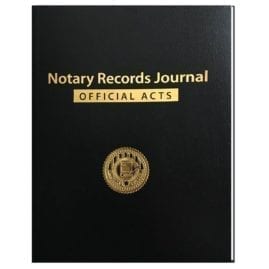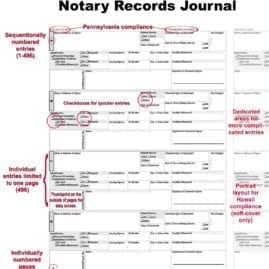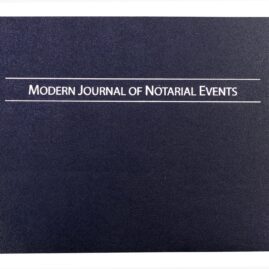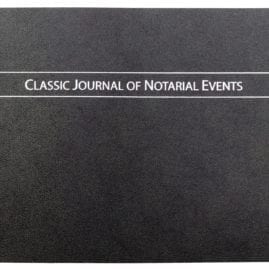Maine Notary Journals
Does Maine require a notary journal?
No. Maine does not require a notary journal.
Source: Maine Notary Public Handbook.
Effective July 14, 1994, pursuant to 4 MRSA Section 955-B, Notaries Public commissioned in and for the State of Maine were no longer required to maintain or keep records of all acts they performed while acting in their capacity as Notaries Public. However, a Notary Public shall make and keep a record of every marriage performed (see 19-A MRSA Section 654). Additionally, the Notary Public must keep a log of petitions for which they administered the circulator’s oath, listing the title of the petition, the name of the circulator taking the oath, the date of the oath and the number of petition forms signed and verified by the circulator that day. (see 21-A, section 902)
The Secretary of State strongly recommends that Notaries Public maintain a record of all notarial acts. Not only is it a good way to keep track of individual acts; it also provides protection for both the Notary Public and the person requesting the notarial service. Additionally, a detailed record of the notarial transaction is useful in the event a Notary Public may be asked to provide documentation to a competent authority (a court of law for example) or testify in or provide a certified copy of the record to some legal proceeding. If the Notary Public decides to maintain records, these records are to remain in the exclusive custody of the Notary Public. The Notary Public may not surrender the records to another Notary Public or to an employer. The records may be inspected in the presence of the Notary Public by any individual whose identity is personally known to the Notary Public (or is proven on the basis of satisfactory evidence) and who specifies the notarial act to be examined.
The Secretary of State strongly believes that record keeping is the best way to ensure the proper conduct of notaries public, both to help protect them and to prevent fraud. A notary public is protected when a record book is maintained. By keeping basic information about the acts that they perform, a notary public is able to defend his or her actions. If the notary public is ever asked to provide evidence of an act performed in or out of court, the notary public can simply refer to the record book. The notary public will have clear and concise documentation that proper procedures were followed when the transaction was completed. Accurate record keeping is especially important when a number of years have lapsed since the notarial act was performed. If the notary public did not maintain a record of a particular act or acts, a claim against the notary public’s actions would be strengthened. An independent record of a notarial act is protection from a variety of issues relating to loss, wrongdoing on the part of the notary public or the signer of the document, or possible law suits.
-
Alabama, Alabama Notary Journals, Alaska, Alaska Notary Journals, Arizona, Arizona Notary Journals, Arkansas, Arkansas Notary Journals, California, California Notary Journals, Colorado, Colorado Notary Journals, Connecticut, Connecticut Notary Journals, Delaware, Delaware Notary Journals, District of Columbia, Florida, Florida Notary Journals, Georgia, Georgia Notary Journals, Hawaii, Hawaii Notary Journals, Idaho, Idaho Notary Journals, Illinois, Illinois Notary Journals, Indiana, Indiana Notary Journals, Iowa, Iowa Notary Journals, Kansas, Kansas Notary Journals, Kentucky, Kentucky Notary Journals, Louisiana, Louisiana Notary Journals, LTBB, Maine, Maine Notary Journals, Maryland, Maryland Notary Journals, Massachusetts, Massachusetts Notary Journals, Michigan, Michigan Notary Journals, Minnesota, Minnesota Notary Journals, Mississippi, Mississippi Notary Journals, Missouri, Missouri Notary Journals, Montana, Montana Notary Journals, Nebraska, Nebraska Notary Journals, Nevada, Nevada Notary Journals, New Hampshire, New Hampshire Notary Journals, New Jersey, New Jersey Notary Journals, New Mexico, New Mexico Notary Journals, New York, New York Notary Journals, North Carolina, North Carolina Notary Journals, North Dakota, North Dakota Notary Journals, Notary Journals, Ohio, Ohio Notary Journals, Oklahoma, Oklahoma Notary Journals, Oregon, Oregon Notary Journals, Pennsylvania, Pennsylvania Notary Journals, Rhode Island, Rhode Island Notary Journals, South Carolina, South Carolina Notary Journals, South Dakota, South Dakota Notary Journals, Tennessee, Tennessee Notary Journals, Texas, Texas Notary Journals, Utah, Utah Notary Journals, Vermont, Vermont Notary Journals, Virginia, Virginia Notary Journals, Washington, Washington D.C., Washington Notary Journals, West Virginia, West Virginia Notary Journals, Wisconsin, Wisconsin Notary Journals, Wyoming, Wyoming Notary Journals
Notary Records Journal
$22.95 – $28.95Notary Records Journal Features:
128 heavy weight pages
496 individually numbered entries (1-496)
Durable, high-quality construction
4 entries per page
Entries contained to one page (no page-spanning entries)
Convenient check boxes to speed up entries
Detailed areas…Select options This product has multiple variants. The options may be chosen on the product pageQuick View -
Alabama, Alabama Notary Journals, Alaska, Alaska Notary Journals, Arizona, Arizona Notary Journals, Arkansas, Arkansas Notary Journals, California, California Notary Journals, Colorado, Colorado Notary Journals, Connecticut, Connecticut Notary Journals, Delaware, Delaware Notary Journals, District of Columbia, Florida, Florida Notary Journals, Georgia, Georgia Notary Journals, Hawaii, Hawaii Notary Journals, Idaho, Idaho Notary Journals, Illinois, Illinois Notary Journals, Indiana, Indiana Notary Journals, Iowa, Iowa Notary Journals, Kansas, Kansas Notary Journals, Kentucky, Kentucky Notary Journals, Louisiana, Louisiana Notary Journals, LTBB, Maine, Maine Notary Journals, Maryland, Maryland Notary Journals, Massachusetts, Massachusetts Notary Journals, Michigan, Michigan Notary Journals, Minnesota, Minnesota Notary Journals, Mississippi, Mississippi Notary Journals, Missouri, Missouri Notary Journals, Montana, Montana Notary Journals, Nebraska, Nebraska Notary Journals, Nevada, Nevada Notary Journals, New Hampshire, New Hampshire Notary Journals, New Jersey, New Jersey Notary Journals, New Mexico, New Mexico Notary Journals, New York, New York Notary Journals, North Carolina, North Carolina Notary Journals, North Dakota, North Dakota Notary Journals, Notary Journals, Ohio, Ohio Notary Journals, Oklahoma, Oklahoma Notary Journals, Oregon, Oregon Notary Journals, Pennsylvania, Pennsylvania Notary Journals, Rhode Island, Rhode Island Notary Journals, South Carolina, South Carolina Notary Journals, South Dakota, South Dakota Notary Journals, Tennessee, Tennessee Notary Journals, Texas, Texas Notary Journals, Utah, Utah Notary Journals, Vermont, Vermont Notary Journals, Virginia, Washington, Washington D.C., Washington Notary Journals, West Virginia, West Virginia Notary Journals, Wisconsin, Wisconsin Notary Journals, Wyoming, Wyoming Notary Journals
Modern Journal of Notarial Events
$22.95 – $28.95We designed our Modern Notary journal to serve the professional Notary public. The ideal journal for Notary signing agents, our Modern Notary journal focuses on loan signings and common Notarial…
Select options This product has multiple variants. The options may be chosen on the product pageQuick View -
Alabama, Alabama Notary Journals, Alaska, Alaska Notary Journals, Arizona, Arizona Notary Journals, Arkansas, Arkansas Notary Journals, California, California Notary Journals, Colorado, Colorado Notary Journals, Connecticut, Connecticut Notary Journals, Delaware, Delaware Notary Journals, District of Columbia, Florida, Florida Notary Journals, Georgia, Georgia Notary Journals, Hawaii, Hawaii Notary Journals, Idaho, Idaho Notary Journals, Illinois, Illinois Notary Journals, Indiana, Indiana Notary Journals, Iowa, Iowa Notary Journals, Kansas, Kansas Notary Journals, Kentucky, Kentucky Notary Journals, Louisiana, Louisiana Notary Journals, LTBB, Maine, Maine Notary Journals, Maryland, Maryland Notary Journals, Massachusetts, Massachusetts Notary Journals, Michigan, Michigan Notary Journals, Minnesota, Minnesota Notary Journals, Mississippi, Mississippi Notary Journals, Missouri, Missouri Notary Journals, Montana, Montana Notary Journals, Nebraska, Nebraska Notary Journals, Nevada, Nevada Notary Journals, New Hampshire, New Hampshire Notary Journals, New Jersey, New Jersey Notary Journals, New Mexico, New Mexico Notary Journals, New York, New York Notary Journals, North Carolina, North Carolina Notary Journals, North Dakota, North Dakota Notary Journals, Notary Journals, Ohio, Ohio Notary Journals, Oklahoma, Oklahoma Notary Journals, Oregon, Oregon Notary Journals, Pennsylvania, Pennsylvania Notary Journals, Rhode Island, Rhode Island Notary Journals, South Carolina, South Carolina Notary Journals, South Dakota, South Dakota Notary Journals, Tennessee, Tennessee Notary Journals, Texas, Texas Notary Journals, Utah, Utah Notary Journals, Vermont, Vermont Notary Journals, Virginia, Virginia Notary Journals, Washington, Washington D.C., Washington Notary Journals, West Virginia, West Virginia Notary Journals, Wisconsin, Wisconsin Notary Journals, Wyoming, Wyoming Notary Journals
Classic Journal of Notarial Events
$22.95 – $28.95Classic Notary Journal
Our Classic Journal of Notarial Events is the journal for workplace notaries. Incredibly durable construction, with 128 heavyweight pages, and room for 15 entries per page. Traditional “Ledger” format.
Select options This product has multiple variants. The options may be chosen on the product pageQuick View








